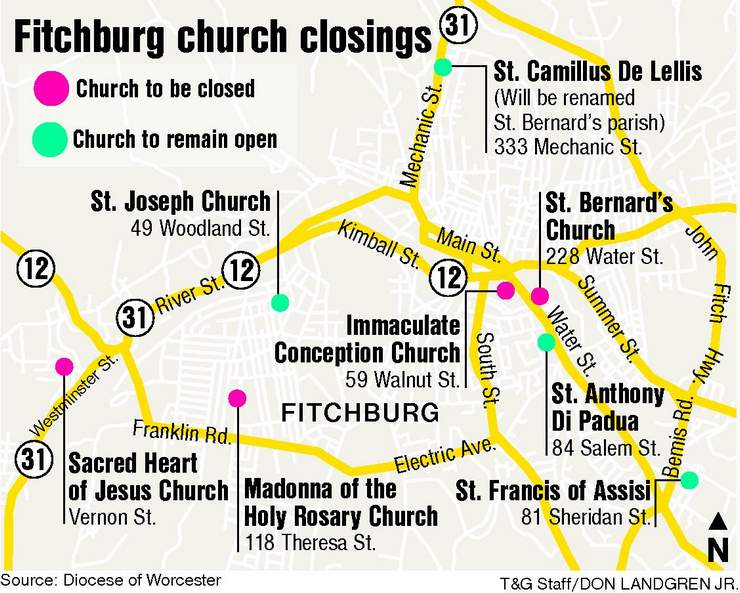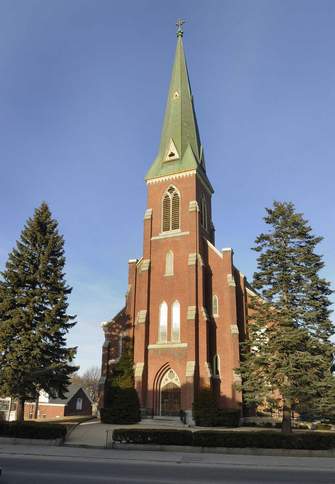Parish Lines Being Redrawn
By Bronislaus B. Kush
Telegram & Gazette
March 6, 2010
http://www.telegram.com/article/20100306/NEWS/3060348/1003/NEWS03
FITCHBURG (MA) -- The Diocese of Worcester this summer will close half the Roman Catholic churches in Fitchburg, including St. Bernard's, the city's oldest Roman Catholic house of worship.
Immaculate Conception, Sacred Heart of Jesus, and Madonna of the Holy Rosary will also be shuttered, effective July 1. St. Anthony Di Padua, St. Camillus De Lellis, St. Francis of Assisi and St. Joseph will remain open to serve Fitchburg's 18,000 to 20,000 Catholics. St. Camillus parish will be renamed St. Bernard's.
Re-assignments of priests and pastors have yet to be determined, officials said.
 |
The church closings are part of a reorganization plan by diocesan officials to cope with a shortage of priests, shifts in demographics, dwindling financial resources and declining church attendance.
The plan has also affected churches in Worcester, Clinton, Harvard, Bolton, Upton, and Mendon.
 |
| St. Bernard's Church on Water Street, Fitchburg's oldest Roman Catholic house of worship, is scheduled to close this summer. |
Officials said a letter from Bishop Robert J. McManus explaining the changes will be read at all weekend Masses in Fitchburg. The closings were expected, given the number and age of the churches serving the community and the dip in church attendance.
With the exception of Worcester, Fitchburg has the largest number of Catholic churches in the diocese. It's estimated that at least half the population is Catholic.
Raymond L. Delisle, the diocesan vice chancellor for operations, said Fitchburg is unique in that five of the eight churches were established by either French-Canadians or Italians. Immaculate Conception, St. Joseph's and St. Francis were founded by those of French descent, while Italians worshipped at St. Anthony's and the Madonna of the Holy Rosary.
The other "territorial parishes," meanwhile, catered to mill workers of varied ethnicity.
Mr. Delisle said ethnicity is no longer a factor in church membership in Fitchburg, and the mills have long closed.
The decision to close the churches was made after four months of study by a panel, the Fitchburg Planning Committee, which was composed of the pastors and two representatives from each parish.
Bishop McManus accepted the committee's recommendation and it was ratified Tuesday by the Presbyterial Council.
Under the plan, the new St. Bernard's parish will assume the assets and liabilities of the old parish, including management of St. Bernard Elementary School and St. Bernard Cemetery. It has yet to be determined which of the surviving parishes will assume the assets and liabilities of the other three churches that will close.
That decision will be made after the chancery receives a joint recommendation from the Diocesan Pastoral Planning Committee, focus groups from each parish, and the Fitchburg Planning Committee, church officials said.
Specific territorial boundaries also have to be drawn up, because the diocese wants to divide the city into quadrants.
Also to be decided is which of the surviving parishes will offer Latin Masses. Those services are now celebrated at Immaculate Conception.
Officials said the Fitchburg Planning Committee spent time defining the city's current and future spiritual needs. They worked on the assumption that there would be only four churches.
Mr. Delisle said diocesan officials determined it didn't make a lot of sense to maintain older buildings that were drawing fewer and fewer people. He said they thought the money would be better spent on expanding ministries and outreach to the community. According to a statement from the diocese, the planners also envisioned more emphasis on educational programs for all ages, more social services, and improved access for the disabled.
They stressed that the four remaining parishes should cherish the many devotional and ethnic traditions of city residents.
Meanwhile, Mr. Delisle said reorganization efforts continue across the diocese.
He said members of the three Grafton churches are trying to decide what's best for their future, and Catholics in Southbridge are grappling with the question of whether they can support four parishes.
"People have been quietly talking about the future throughout the diocese," Mr. Delisle said.
Any original material on these pages is copyright © BishopAccountability.org 2004. Reproduce freely with attribution.